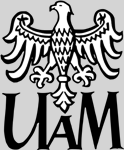Jerzy Pogonowski - Curriculum Vitae
From Department of Applied Logic
| Revision as of 11:50, 28 June 2007 (edit) Pogonowski (Talk | contribs) ← Previous diff |
Revision as of 17:09, 3 September 2009 (edit) (undo) Pogonowski (Talk | contribs) Next diff → |
||
| Line 56: | Line 56: | ||
| * mathematical logic, | * mathematical logic, | ||
| - | * logical semiotics, | + | * recursive functions, |
| - | * general and typological linguistics, | + | * introduction to mathematics, |
| - | * recursive functions, social communication, | + | * logic, |
| - | * introduction to mathematics, | + | |
| * methodology of sciences, | * methodology of sciences, | ||
| - | * belief systems. | + | * belief systems, |
| + | * logical semiotics, | ||
| + | * social communication, | ||
| + | * general and typological linguistics. | ||
| '''PhD students:''' | '''PhD students:''' | ||
| Line 67: | Line 69: | ||
| * Dorota Lipowska (née Tomczak) (1988), | * Dorota Lipowska (née Tomczak) (1988), | ||
| * Anna Pietryga (née Luchowska) (1994), | * Anna Pietryga (née Luchowska) (1994), | ||
| - | * Wlodzimierz Lapis (1999), | + | * Włodzimierz Lapis (1999), |
| - | * Slawomir Sikora (2000), | + | * Sławomir Sikora (2000), |
| - | * Marcin Junczys-Dowmunt (since 2005), | + | * Marcin Junczys-Dowmunt (2009), |
| - | * Victoria Kamasa (since 2006). | + | * Victoria Kamasa (since 2006), |
| + | * Michał Lipnicki (since 2009). | ||
| '''Current interest:''' | '''Current interest:''' | ||
| + | * mathematical foundations of metalogic, | ||
| * logical foundations of language and linguistic aspects of logic, | * logical foundations of language and linguistic aspects of logic, | ||
| * argumentation and persuasion, | * argumentation and persuasion, | ||
Revision as of 17:09, 3 September 2009
CV | Research | Teaching | Publications | Texts on line
Born: November 28, 1951
M.A.: mathematics, 1974, Warsaw University (Supervisor: Prof. Andrzej Mostowski) On generalizations of Ehrenfeucht's games.
PhD: linguistics, 1976, Adam Mickiewicz Univ. (Supervisor: Prof. Jerzy Banczerowski) Mathematical model of linguistic analysis.
Habilschrift: linguistics, 1981, Adam Mickiewicz Univ. Tolerance Spaces with Applications to Linguistics.
Professor: humanities, 1991.
Academic Publications: a few dozens of works concerning mainly:
- logical reconstruction of linguistic theories,
- applications of mathematical logic to linguistics,
- methodology of sciences,
- history of logic.
Present Position: Head of the Department of Applied Logic, Institute of Linguistics, Adam Mickiewicz University (since 1995).
Previously - Head of the Departments of:
- General Linguistics (1981-1982),
- Applied Linguistics and Information Science (1983-1991),
- Methodology of Linguistics (1991-1995) (all at the Adam Mickiewicz University);
- Deputy Director of the Institute of Linguistics (1986-1991).
Employment:
- Department of Mathematical Logic, Institute of Mathematics (1974-75),
- Institute of Linguistics (since 1975) of the Adam Mickiewicz University.
Additional Employment:
- Mathematical Institute of the Polish Academy of Sciences (1977-1978),
- Chair of Applied Mathematics of the Academy of Economics in Poznan (1993-1994).
Fellowships:
- Department of Linguistics, SUNY at Buffalo (1978-1979 visiting research scholar),
- Department of German Philology, University of Munich (1983-1984 Alexander von Humboldt Stiftung),
- Department of Linguistics, SUNY at Buffalo (1990, International Research Exchange Board),
- Fachbereich Philosophie der Universität Konstanz (2003, Alexander von Humboldt Stiftung).
Classes:
- mathematical logic,
- recursive functions,
- introduction to mathematics,
- logic,
- methodology of sciences,
- belief systems,
- logical semiotics,
- social communication,
- general and typological linguistics.
PhD students:
- Dorota Lipowska (née Tomczak) (1988),
- Anna Pietryga (née Luchowska) (1994),
- Włodzimierz Lapis (1999),
- Sławomir Sikora (2000),
- Marcin Junczys-Dowmunt (2009),
- Victoria Kamasa (since 2006),
- Michał Lipnicki (since 2009).
Current interest:
- mathematical foundations of metalogic,
- logical foundations of language and linguistic aspects of logic,
- argumentation and persuasion,
- logical analysis of social communication,
- philosophy of logic and mathematics.



